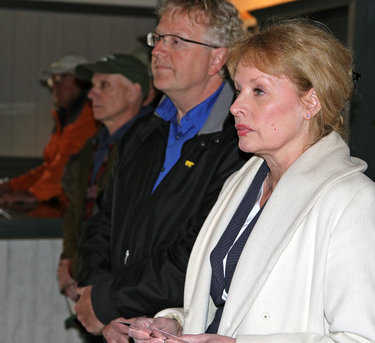Caucus or primary? Democrats to vote
GUILDERLAND — Several members of the Guilderland Democratic Committee have been researching the differences between the caucus system, which the party now uses, and the primary system, to consider whether Democrats should switch to using a primary to select candidates.
The subcommittee recently made a split recommendation, according to Committee Chairman Jacob Crawford. According to a report written by subcommittee member Daniel Centi, which Crawford sent to The Enterprise, five of the seven members — more than two-thirds — want to keep the caucus in some form, while just two said the Democrats should switch to a primary. Three of the subcommittee members wanted to keep the caucus but find a way to allow for absentee voting or voting by proxy; two want to keep it as-is.
The 11-member executive committee, Crawford told The Enterprise, is not taking a stand. It will recommend to the full 60-member Democratic committee only that the matter be discussed, debated, and voted on. The 60-member full committee will then vote, likely in late January or early February; it would require a two-thirds majority to make a change its candidate-selection system.
Committee member Steve Wickham, who ran unsuccessfully for the county legislature in 2019 and now heads the grassroots activist group Guilderland Coalition for Responsible Growth, took issue with the report’s description of the members’ stances, when contacted by The Enterprise.
It would be more accurate to say, Wickham said, that two members were firmly for the caucus as-is, and two members including himself were firmly for the primary. The other three, Wickham said, indicated they would support a caucus if all of the problems with that system could be solved; absentee ballots are just one problem, he said.
Jim Cohen also favored a primary, Wickham said. The other subcommittee members are Sharon Cupoli, Betty Head, Deb Riitano, and Brandon Russell.
Crawford and subcommittee member Centi said that the committee members’ split does not mean the vote by the full committee will necessarily favor the caucus system. Centi told The Enterprise, “I was one of those who said ‘retain it as-is,’ but it’s a soft recommendation. I’m not sure how I would feel about it if it came up for a full vote.”
The stakes are high because the candidate chosen by the Democrat Party is almost assured of election, since Guilderland is a heavily Democratic town.
Of the roughly 23,000 registered voters in Guilderland, nearly 10,000 are enrolled as Democrats, over 5,000 are enrolled as Republicans, roughly 6,000 are unaffiliated, and the rest belong to small parties. All of the current elected office holders in town were backed by the Democratic Party.
Critics of Guilderland’s caucus system say the caucus allows mostly committee members to pick the candidate, since they are typically the ones who attend caucuses. They say a caucus is not inclusive or readily accessible to people with handicaps or to members of the military, college students, and others who cannot be present for the in-person vote.

Caucus proponent
Centi, who researched the caucus and primary systems, turned that claim around, telling The Enterprise that the primary system is unfair because it would make it difficult for a candidate with disabilities to succeed in Guilderland, since it would be hard for someone with mobility issues to go door-to-door in Guilderland, seeking the needed signatures on petitions. This is particularly true now that election reform has pushed the start of petitioning forward to February, he wrote in the report.
“We have more than 30,000 people in the town, and we’re spread out too,” Centi told The Enterprise.
Centi doesn’t call it a “primary system,” but instead uses the phrase “petition system.” He wants people to know, he said, that a primary isn’t about just one day of voting but about the weeks of work that lead up to it.
Laurel Bohl’s unexpected nomination for town board and addition to the Democratic ticket at the April 2019 caucus “exposed a weakness” in the caucus system, Centi said; the caucus system allows people who have not been vetted by the committee to become candidates. Bohl was nominated by her husband at the caucus, leaving many in attendance surprised.
The Democratic Committee had endorsed just one candidate — incumbent Councilwoman Rosemary Centi, Daniel’s wife — when two seats were open, so Bohl got the nod.
Bohl turned out to be a good candidate, Centi said, but gave a hypothetical example that he called extreme: that a candidate nominated and added to the ticket at the last minute could turn out to be a convicted bank robber.
The Democrats in two other Capital Region towns that are the same size or bigger than Guilderland — Colonie and Bethlehem — use a primary rather than a caucus. In other Capital Region towns, smaller than Guilderland, Democrats hold caucuses.
A primary goes on all day, is run by the Albany County Board of Elections, and allows people to vote at a convenient time, at a handicapped-accessible place near their home; it also allows for absentee voting.
A caucus is held at a single location on a specific date and at a certain time. Participants may need to wait for an hour or two before voting, as they did at the crowded and hot primary in July 2018 at a pavilion in Tawasentha Park.
Primaries require a lot more work for candidates and the party, including going door-to-door to gather signatures from 5 percent of the enrolled Democrats in the town. Crawford told The Enterprise earlier that, because of issues such as challenges to signatures, it is important to get many more than required, even as many as 15 percent.
There are currently 9,825 enrolled Democrats in Guilderland, so 5 percent would be 491.
Merits of the caucus system, according to the report, include that it is simple to implement and conduct; legal challenges are rare, with last year’s lawsuit a rare exception; its expenses are modest; it has worked well in terms of producing candidates who go on to win the general election; and the caucus is “an event for committeemen to meet in a social setting, strengthen bonds, and exchange information among themselves and with Democrats who are not committeemen. These attendees are among the most active or interested Democrats in Guilderland, people who directly assist our candidates in their campaigns, support them financially, post signs on their property, etc.”
By law, switching from one system to another, whether caucus to primary or the reverse, requires a supramajority of two-thirds, or 40 members of the 60-member committee, and must be done at least four months before the primary date, to take effect that year.
This year’s state primary date is June 23, but there is no scheduled election for the town of Guilderland this year, so until 2021 there would be no caucus or primary in Guilderland regardless of how the committee’s vote turns out, according to Crawford.
The vote for caucus or primary by the 60-member full committee will be an open vote, done by roll-call, voice vote, or raising of hands, Crawford said.
Background
The controversy over the caucus system arose during the process of replacing town judge Richard Sherwood. Sherwood was arrested in February 2018, when he was a Guilderland town judge, for stealing millions of dollars from elderly clients whose estates he managed in his work as a private attorney. Sherwood is now serving a federal sentence of four-and-a-half years and a concurrent state sentence of 3 to 9 years.
In April 2018, the Guilderland Town Board chose attorney Christine Napierski, from a field of 14 candidates — all lawyers, to replace Sherwood. But two months later, the Guilderland Democratic Committee announced it was backing instead then-county legislator, and long-time committee member Bryan Clenahan who was one of the 14 original applicants.
Napierski and her father and law partner, Eugene Napierski, brought a lawsuit in July, a week before the scheduled caucus, in an effort to stop it, writing in their complaint that the Guilderland Democratic Committee has “exploited the caucus method to ensure that the candidate it has hand-selected coasts through to nomination without any meaningful opposition or challenges.” The Napierskis argued that the caucus system severely limited participation by anyone other than committee members and their families.
Their suit failed and Clenahan won the caucus narrowly but went on to win the general election decisively over both Napierski and Republican candidate Stephen Chesley.
Primary proponents
Even though her candidacy was endorsed in a caucus, Bohl said she thinks the Guilderland Democratic party should move to a primary system. “I think it’s a lot more out in the open; it’s a lot more transparent, more open to everyone,” she told The Enterprise earlier.
WIth a primary system, she said this week, anyone can get onto the ballot if they get enough signatures from the public and submit them to the board of elections, and then “the people decide who the better candidate is in the primary.”
The way the caucus works, in practice, “leaves the public out of the initial decision-making process and leaves it all largely in the hands of the party,” Bohl said. She added, “The party usually pre-selects, vets, and interviews people who they want to run, then quietly selects a time and place with very little publicized notice to the public of where and when it is.”
The public is “completely unaware,” Bohl said, that, if they want to run, they have the right to “go to this little known almost private event and state they wish to run and have people there to vote for them.”
In her opinion, Bohl said, “the difference is that a caucus is more in the control of the party and a primary is more in control of the public.”
Responding to Centi’s concern, Bohl said that a convicted bank robber could also conceivably get onto a ballot with enough signatures, but that any criminal background would presumably come to light before the election “and presumably prior to any party endorsements.”
The real question, she said, is: When should a party endorse a candidate? She answered by saying “The more democratic idea is for a party to hold off on endorsing anyone until candidates are selected by the public.” This is not a novel idea, she said; it’s how our national elections are run.
Bohl said candidates with disabilities would unfortunately face difficulties with either system: They would have a harder time going door-to-door in the general election either way even if the caucus system were maintained.
Primaries offer extended voting hours, Christine Napierski said this week; she added that now, with early voting, New Yorkers have weeks to cast their votes.
“Primaries make it easier for voters, for citizens, not for the candidates,” Napierski said. “If you’re a candidate, you accept all of the difficulties of that, whether you’re disabled or not.” She said it isn’t true that a candidate with disabilities couldn’t run. “You could still reach people with social media,” she offered.
“I don't think they are afraid many bank robbers will be running for town office,” Napierski concluded. “I think the committee really wants to keep control of who gets nominated, and that is why they prefer a caucus to a primary.”



